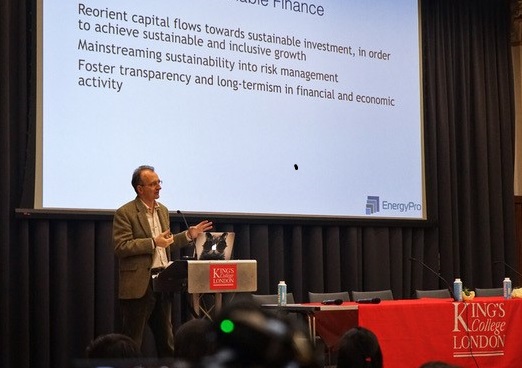Wednesday 1 May 2019
‘Every investment is an impact investment’
Amy Clarke, Tribe Impact Capital
I have been thinking a lot about impact investing since speaking at the King’s Impact Investing Society conference at the end of January. There still seems to be a lot of debate about definitions but it seems clear that impact investing is any investment which is aimed at achieving a positive impact on some societal problem as well as a financial return, personally I think of it as investing to have a positive impact on sustainability. Then the question of how to benchmark and measure that impact arises. The Sustainable Development Goals (SDGs) are a good roadmap to all the areas where we need to improve sustainability – across environmental, social and economic spheres – and can form the basis of measurement. Impact investing aims to have a positive impact on key sustainability problems as well as make a return, it is not philanthropy. At the King’s conference Amy Clarke, the founder of Tribe said, “every investment is an impact investment” and that is correct – every investment has multiple impacts in the areas covered by the SDGs, some good, some bad, some intentional and some unintended. Impact investing is about focusing on making a positive impact as well as a financial return.
The question, that for so long has not been asked, and which impact investors ask, is what is the impact of this investment on the non-financial factors such as the environment, gender inequality, access to basic services or whatever areas the investment affects. Taking a systems view, we need to ask what is the totality of all the impacts of the investment? An impact investment should be positive in its impact on at least some of these factors. Important questions include; what is the base line for comparison, what are the targets and how do we measure progress? The SDGs are a set of global targets covering all aspects, economic, environmental and social and provide an overall context. Various initiatives to define and measure impacts now exist and are beginning to be applied more often. The Impact Management Project, which grew out of a project by Bridges Fund Management is one emerging global impact measurement tool.
Of course financial investors are not the only decision makers who have impact. Managers of organisations make decisions every day, small and large that have multi-dimensional impacts – whether they be decisions on which mode of travel to take or decisions to build a new factory or develop a new product. A systems based approach to investment appraisal should cover the non-financial impacts, both good and bad. To what extent and how do organisations that have environmental goals factor this into every decision? Appraisal of capital investment and the way it is taught and practiced is almost entirely focused on the financial aspect and yet we know that other non-financial factors can be more strategic and therefore important.
Consumers make purchase decisions every-day that have impacts – often impacts in distant and remote parts of the world in some part of the long supply chains, impacts that can be negative in various aspects when viewed against the lens of the SDGs. Systems that bring greater transparency of the impacts to consumers have emerged but we need a lot more of them such that consumers can factor them into their decisions. How can we measure and communicate the wider impact of relatively small purchase decisions to consumers?
Impact investing is growing in volume and this is a really positive trend but we also need to think about, and talk about impact managing and impact consuming. Every investment decision, every management decision and every purchase decision has multiple impacts.
EnergyPro works to identify, develop and implement impact investment opportunities, particularly in support of the energy transition but also in other dimensions of sustainability. We also work with organisations to help them make more impactful decisions.
If we can help you in these areas let us know.

Steve Fawkes speaking at King’s Impact Investing Society Conference 2019
Comments
Comments are closed.
Dr Steven Fawkes
Welcome to my blog on energy efficiency and energy efficiency financing. The first question people ask is why my blog is called 'only eleven percent' - the answer is here. I look forward to engaging with you!
Tag cloud
Black & Veatch Building technologies Caludie Haignere China Climate co-benefits David Cameron E.On EDF EDF Pulse awards Emissions Energy Energy Bill Energy Efficiency Energy Efficiency Mission energy security Environment Europe FERC Finance Fusion Government Henri Proglio innovation Innovation Gateway investment in energy Investor Confidence Project Investors Jevons paradox M&V Management net zero new technology NorthWestern Energy Stakeholders Nuclear Prime Minister RBS renewables Research survey Technology uk energy policy US USA Wind farmsMy latest entries
- Ethical AI: or ‘Open the Pod Bay Doors HAL’
- ‘This is not the end. It is not even the beginning of the end. But it is, perhaps, the end of the beginning’
- You ain’t seen nothing yet
- Are energy engineers fighting the last war?
- Book review: ‘Stellar’ by James Arbib and Tony Seba
- Oh no – not the barriers again
- Don’t assume ignorance, sloth, bias or stupidity


